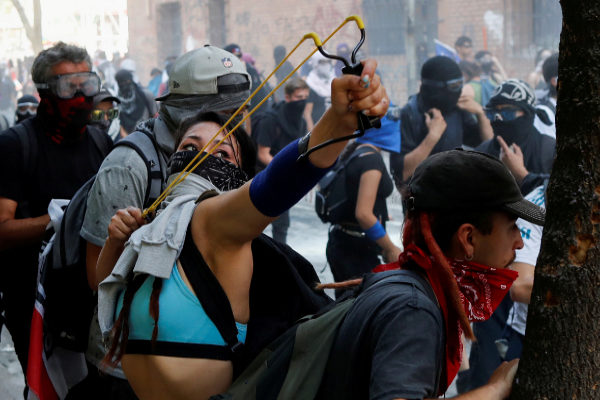- Direct witness: Fire and destruction organization in Chile against the symbols of power
The Chilean Congress reached a historic agreement in the early hours of Friday to convene in April 2020 a plebiscite with a new Constitution that replaces the one in force since the dictatorship of Augusto Pinochet (1973-1990), after almost a month of protests.
"It is a policy response with a capital letter, which thinks of Chile and also takes over and assumes responsibility," said Senate President Jaime Quintana, a member of the opposition Democracy Party (center-left), flanked by leaders of the main political formations of the country, with the exception of the Communist Party, at an early morning press conference at one of the Congress headquarters in Santiago.
After hours of intense negotiations, the main opposition parties and the right-wing government coalition Sebastián Piñera signed an "Agreement for peace and the new Constitution", in which they pledged to approve a call to plebiscite.
Under this agreement, necessary to modify the current Magna Carta, which does not allow calling a referendum for these purposes, a consultation will be encouraged in April 2020 to resolve two questions: whether or not a new one is wanted Constitution and what kind of body should write it: a "mixed constitutional commission", a "constitutional convention" or a constituent Assembly, Quintana explained.
The mixed constitutional convention, defended by the parties of the right-wing government coalition, will be integrated equally by members elected for this purpose and parliamentarians in office, while in the "constitutional convention", promoted by the opposition parties, all its members will be chosen specifically for this occasion.
The new text will be written from a "blank sheet", without being based on the current Constitution , as defended by the ruling party for cases in which the quorum of two-thirds that was established to approve all those rules and regulations That they want to introduce.
The election of the members of the constituent body will be held in October 2020 together with the regional and municipal elections under universal suffrage.
This body will have a period of nine months to draft the new Constitution, extendable only once for three more months.
Once the new Magna Carta has been drafted, it will be submitted for ratification in another referendum through mandatory universal suffrage.
"We are happy to have been able to contribute to approve an agreement that defeats violence," said Jacqueline van Rysselberghe, president of the ultraconservative Independent Democratic Union (UDI), the main party of the coalition of parties in the Piñera government.
"People were able to move the barriers of politics, to move the barriers as much as possible. Yes, we can dream of a constituent Assembly," Catalina Pérez, president of the Democratic Revolution (radical left).
From evading the subway to a change of the Constitution
The agreement was reached after almost a month of protests to demand deep social reforms from the government. The demonstrations were accompanied by violent episodes that left 22 dead and thousands injured and detained in massive street demonstrations, looting, fires and clashes with the police.
Faced with a country that was burning, Piñera opted for a "peace agreement", instead of bringing the military back to the streets, as he did in the first nine days of the social crisis. The demonstrations began after a call to evade the payment of the Santiago metro ticket, after a rate hike, and quickly became the biggest revolt in three decades in the country.
"This agreement is a first step, but it is a historical and fundamental first step to start building our new social pact, and in this the citizenship will have a leading role," said Interior Minister Gonzalo Blumel.
"What started with the evasion of the subway, ended with the beginning of a constitutional, historical and unpublished process that will have citizen participation for the first time," wrote journalist Lucia Lopez on Twitter.
Death of the Constitution of the dictatorship
The agreement was approved in a Congress in which none of the political forces had the two thirds necessary for any substantive modification of the Constitution.
The Magna Carta had had some modifications, but had never prospered any initiative to change it in almost 30 years of democracy.
"The Constitution of the dictatorship dies and one is born in democracy," celebrated progressive senator and former Foreign Minister Heraldo Muáoz.
Pinochet's Constitution was at the forefront of criticism from Chileans, who called for greater participation in decision-making and social reforms in key sectors such as education, health, pensions and education.
Approved in 1980 in a questioned referendum, the dictatorship designed it as a suit to suit its influence and that of the conservative sectors could be maintained even after the return of democracy, in 1990.
In 2005, after a great political agreement, in which even the signature of the former dictator was withdrawn from the fundamental letter , the most antidemocratic principles were eliminated, such as allowing the dismissal of military chiefs and the appointed and lifetime senators were eliminated.
During the previous government of the socialist Michelle Bachelet (2014-2018) a constitutional change was proposed, but he did not receive the support of citizens.
According to the criteria of The Trust Project
Know more- Chile
- Senate
- Sebastian Piñera
- World
Latin America Human Rights Organizations denounce torture, shooting at civilians and sexual violence in Chile
Latin America1.2 million people: historic and peaceful march in Chile
Judgment of the 'procés' The Supreme Court ruling on the 'procés' amendment to the King and the three powers of the State

